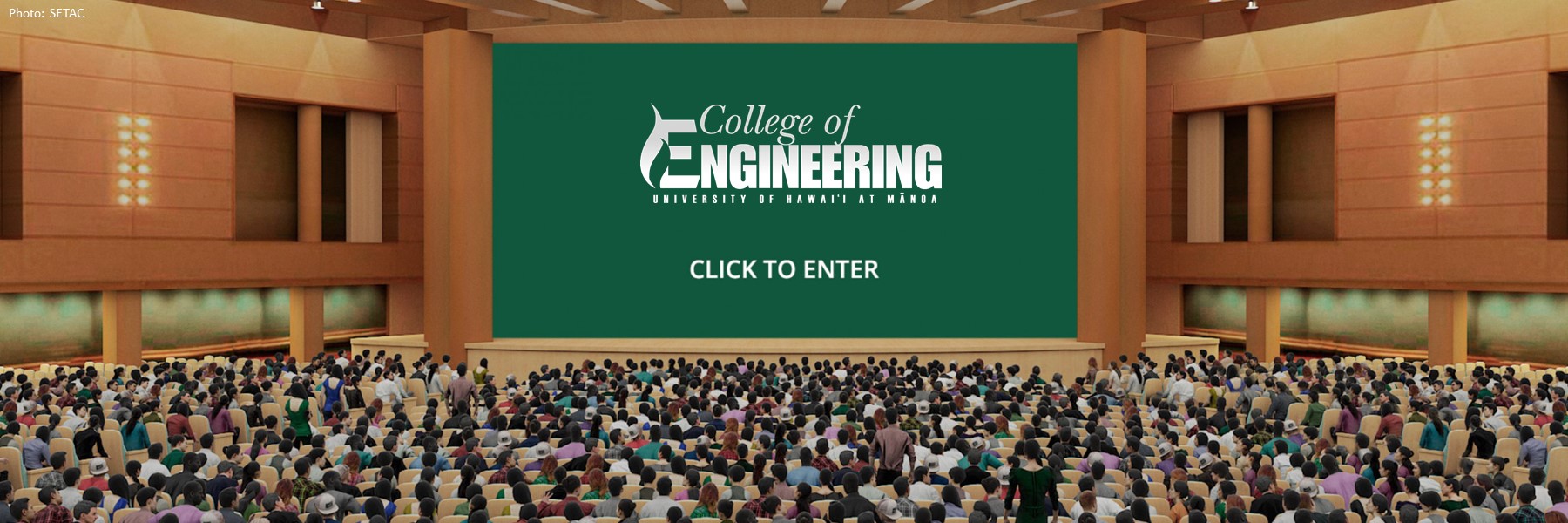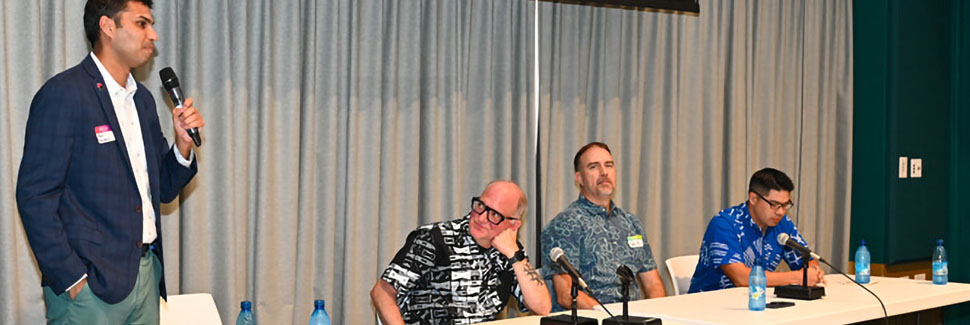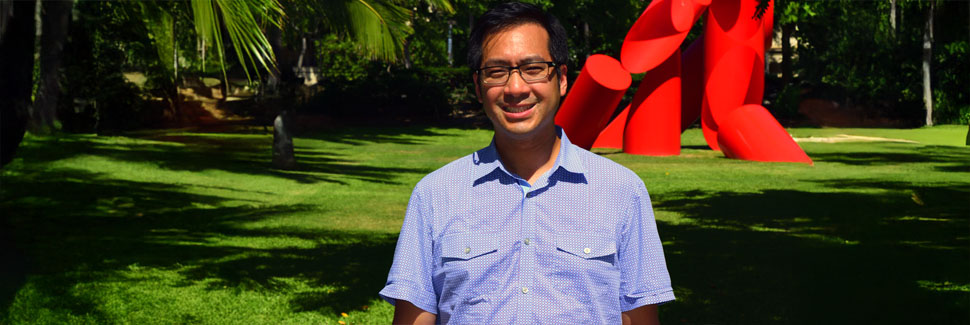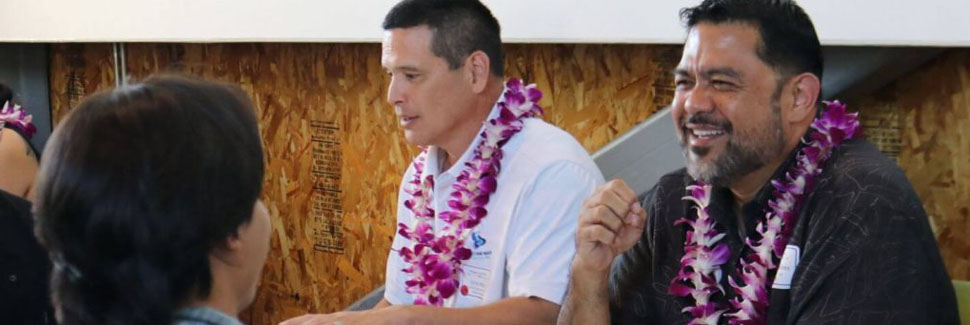
The state of the College of Engineering
On August 24, 2020, the college welcomed back over 1,300 students and 62 faculty to campus for the start of the fall semester. Fall classes are currently being delivered via a mix of online, hybrid, and face-to-face formats, following strict social distancing and safety regulations for on- campus interactions. Under the leadership of Dean Brennon Morioka, faculty and staff remain committed to serving their students and providing the same quality education while adjusting to ever-changing conditions.
SAVE THE DATE!
Join the college online for the following events in fall 2020. You may learn more by visiting www.eng.hawaii.edu/allevents
- Engineering Talk Story Sessions, for prospective students – Saturday, September 12
from 9:00-10:00am and Thursday, September 17 from 7:00-8:00pm via Zoom. - Fall Career Day – Wednesday, September 23 from 9:00-12:00pm and 1:00-4:00pm via
virtual platform. Employers, students, and alumni may register to participate through
the above event website. - College of Engineering Faculty & Staff Awards Ceremony – Friday, September 25 from 3:30-4:30pm via livestream from Holmes Hall.
- ALOHAnet IEEE Milestone Dedication Ceremony – Tuesday, November 10 from 10:30- 11:30am via livestream from Holmes Hall.
- Fall Convocation – Friday, December 18 at 5:30pm. More details to come.
Read on for highlights from the college for the 2019-2020 academic year.
FACULTY
- New faculty – due to the State’s hiring freeze, no new faculty were hired in the last fiscal year. However, the college has established its hiring priorities for the future, with plans to add faculty positions in all departments when economic conditions allow.
October 2019:
- Phillip Ooi received the Transportation Research Board’s 2019 Geotechnical Engineering
Section’s Best Paper Award for his team’s paper, “Long-Term Behavior of a Geosynthetic
Reinforced Soil Integrated Bridge System in Hawaiʻi.” - Yi Zuo invented a groundbreaking method allowing for easy determination of the
surface free energy of particles as a quantitative measure of particle hydrophobicity,
and his research was showcased on the cover of Analytical Chemistry.
December 2019:
- The National Science Foundation awarded technology company Adnoviv, co-founded by
electrical engineering professors Olga Borić-Lubecke and Victor Lubecke, an additional
$150,000 grant to their previous $750,000 grant to develop a battery-operated version
of their low-cost sensor capable of sensing the presence and number of individuals in a
room. - A team lead by Sayed Bateni was awarded a $900,000 grant by the USDA’s Natural Resources Conservation Service (NRCS) through a program that supports the conservation of private lands through funding projects centered in technology and innovation. Their goal is to demonstrate how farmers can conserve water and be more effective in utilizing water resources by utilizing an innovative new method to model and forecast daily rainfall and evaporation in irrigation areas.
February 2020:
- A study by Guohui Zhang and David Ma focused on extreme-weather car-crash injuries was awarded the 2020 Best Young Researcher Paper by the Transportation Research Board Transportation Safety Management Committee.
April 2020:
- Roger Babcock was awarded a Board of Regents Medal for Excellence in Teaching from UH Mānoa, out of nearly 300 campus-wide nominations.
- Tao Yan received an NSF grant for more than $150,000 to conduct local wastewater testing with the goal of determining the community disease burden of COVID-19.
- Mechanical Engineering Associate Professors A Zachary Trimble and Scott Miller helped develop an innovative technique to treat up to four COVID-19 patients with a single ventilator, which was tested with partners at the Kapiʻolani Medical Center for Women and Children.
May 2020:
- Sayed Bateni was awarded a Fulbright scholarship to conduct water research in Qatar, aiming to predict heat wave duration and intensity by merging remotely sensed land surface temperature and meteorological data within machine learning approaches.
- Three faculty members received Hi Chang Chai Faculty Teaching Awards, one from each department as voted on by the students: Ian Robertson (CEE), Aaron Ohta (EE), and Scott Miller (ME).
- Associate Dean David Ma‘s project that generates electricity from water drops was published in Nano Energy — one of the top journals in energy, electrical engineering and renewable energy & sustainability.
June 2020:
- With David Ma at the helm, the college partnered with the Hawaiʻi Department of Transportation, Federal Highway Administration, Econolite, and Goldwings Supply on a $6 million pilot project expected to greatly improve traffic flow through a critical Honolulu corridor. This unprecedented initiative along Nimitz Highway and Ala Moana Boulevard will utilize “Vehicle-to-Everything” communication technology, connecting vehicles, pedestrians and bicyclists to the infrastructure.
- The college received $1.2 million of a total $1.8 million award to UH from the Office of Naval Research to evaluate and study issues related to the Red Hill Fuel Tanks in Hawai‘i.
STUDENTS
November 2019:
- The Entrepreneurs’ Organization Hawai‘i named ME undergrad Austin Yoshino the winner of the qualifier for the Global Student Entrepreneur Awards for his company, Manaola Innovations, Inc. Founded in dedication to Yoshino’s younger brother, who has cerebral palsy, the company develops innovative products including a technologically enhanced walking assistant device.
December 2019:
- Engineering student Josh Renzo Claudio was selected as the UH Mānoa fall 2019 commencement student speaker.
February 2020: - Wahine volleyball player and engineering student Rika Okino was named the 2020 Hawaii Council of Engineering Societies Student Engineer of the Year.
April 2020:
- Nicholas Yama, a senior, and Kevin Kam, a recent graduate, were each awarded a $135,000 National Science Foundation Graduate Research Fellowship. They were two out of only 59 electrical engineering students selected nationwide.
- Environmental engineering PhD candidate Sabrina Diemert was named this year’s recipient of the Frances Davis Award for Excellence in Undergraduate Teaching for a Graduate Assistant.
May 2020:
- Three seniors received Outstanding Graduating Senior recognitions: Rika Okino (CEE), Nicholas Yama (EE), and Kayli Chun (ME). At the graduate level, Yeon Sang You received the Outstanding Teaching Assistant award and Kareem Elassy received the Outstanding PhD Student award. The EE Department’s first ever Bruce Liebert award went to Kai Outlaw-Spruell.
- To celebrate spring graduates who would not experience an in-person graduation, masters student Brianne Tengan built a virtual composite of the UH campus in the game Minecraft and planned and executed a commencement ceremony in the virtual world, streamed live.
June 2020:
- ME undergrad John Sadorra was awarded the 2020-2021 Chancellor Virginia S. Hinshaw Scholarship in Sustainability.
July 2020:
- Arif Rahman, a 2018 University of Hawaiʻi at Mānoa electrical engineering PhD graduate, received a two-year, $120,000 postdoctoral fellowship to develop a space medical oxygen delivery system.
- A group of four UH students, including engineering majors Jonathan Wallen and Maddyson Jesketook, the top prize in the U.S. Department of Energy 2020 Marine Energy Collegiate Competition for their underwater vehicle charging station.
August 2020:
- Under the guidance of Professor Albert Kim, CEE students Mia Fong, Brenton Sasaoka and Seth Colburn designed a predictive model that forecasts COVID-19 cases and deaths.
COLLEGE-WIDE
- 2019-2020 was an impressive year for research, with the college bringing in a record of over 17 million dollars in research awards across departments – which doubles the amount from the year prior, and quadruples the amount from the year before that.
- Many long-standing college events went virtual this spring, including the Annual Banquet fundraiser, which surpassed its goal of raising $100,000 for student projects and clubs, the Open House for admitted students, and the Order of the Engineer ceremony for graduating students.
- Industry-integrated courses have become widely popular at the college, allowing students to earn college credit for tackling real-world problems alongside industry professionals. The college has partnered with organizations such as DataHouse, Hawai‘i Dental Service and Pearl Harbor Naval Shipyard to offer these unique courses to both undergraduate and graduate students.
- The college recently underwent a deep cleaning in an effort to utilize its facilities more efficiently and accommodate its expanding list of classes and programs. Faculty, staff, and students joined forces to clean labs and offices, sorting through inventory and filling up dumpsters with discarded items.
- New administrative improvements to help the college become more effective and efficient included: a strategic communications plan, updated policies and procedures, and enhanced training on customer service, cultural sensitivity, leadership, and fiscal processes.
- Through a partnership with the Pearl Harbor Naval Shipyard and Intermediate Maintenance Facility (PHNS), students and faculty now have access to a state-of-the-art 3D metal printer for educational and research purposes (valued at roughly $250,000).
- The college is playing a leading role in driving the O‘ahu Engineering Sector Partnership, a group designed to foster cross-sector dialogue and collaboration between industry and education to better understand Hawai‘i’s current engineering talent pipeline and develop strategies to improve student preparedness for careers in engineering. Along with the Chamber of Commerce Hawai‘i, UH helped plan a solutions-focused virtual strategy session in July that drew 40 business leaders and educational partners.
- Like other universities across the globe, UH Mānoa is bracing for significant budget cuts this fiscal year due to the economic impact of the COVID-19 pandemic. More than ever, the college will be looking at ways to cut costs in the upcoming year, with as little impact as possible to students and their educational experience. Despite the economic challenges, the college is confident that it will still be able to fulfil its mission of providing students with an exceptional education with the support of its faculty, staff, industry partners, and the community at large.



